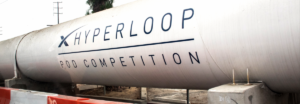Written by Greg Gies on August 21, 2018

If you were at the beach last weekend soaking up the sun, you can be forgiven for not hearing that Team WARR Hyperloop, a group of engineering students from the Technical University of Munich, completed a three-peat by winning the 3rd SpaceX Hyperloop Pod Competition when their prototype achieved a top speed of 284 miles per hour on a ¾-mile test track at SpaceX headquarters in Hawthorne, California.
For the rare few of you who don’t know what Hyperloop is, it’s the latest sustainable transportation innovation to come from the mind of Elon Musk, the current CEO and founder of Tesla Motors, SpaceX, The Boring Company and DeepMind Technologies.
Briefly, the hyperloop is a subterranean electromagnetically-driven mass transit system that could theoretically achieve supersonic speeds while shuttling people over long distances through a near-vacuum tube for a fraction of the price of airliners, and with a much lower carbon footprint. (Hint: Think of the pneumatic tubes that were commonly found at your local drive-through bank before ATMs killed the bank teller – but on a human scale.) Watch this video for a better 90-second explainer.
You might be asking, “why am I reading about a high-tech drag race between geeks in a blog about construction?”
While this technology is only now at the incubation stage, it, along with associated tunneling innovations being developed by The Boring Company, has the potential for transformational change in transportation infrastructure construction by dramatically improving the economics of mass transit.
Even though a major shift in the number and scale of underground transportation hyperloop construction projects is likely decades away in the future (if it happens at all), the hyperloop concept is already beginning to have an impact on construction projects at the local level.
There are already a dozen projects in various stages of planning and development from Maryland to California and points in between, ranging in value from $1.5 to $150 million.
Most notably, are the Midwest-Connect Hyperloop Project (DR201800579832) and the East Coast Hyperloop Track Project (DR201700826932) that plan to connect Columbus, OH to Pittsburgh and Chicago and Baltimore to Washington, DC respectively.
Whether you’re a manufacturer, contractor or construction services firm it makes sense to monitor these early projects as they proceed. Or, you may even decide to bid on work, equipment or services that will be required at a hyperloop construction project. Getting involved now could be an effective hedge that positions your firm for the future of hyperloop construction should it accelerate.
To learn more about Hyperloop construction projects or to get the details about any construction project in the US or Canada, contact Dodge Data & Analytics, the leader in construction market intelligence.
